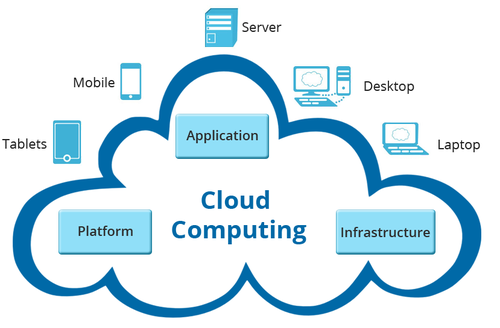Cloud Computing Services
Cloud computing services are a big category of assistance provided by Cloud Service Provider. Cloud services are a great choice if you want to make your company processes more flexible, scalable and secure.
There are three basic types of cloud services you can provide for your company:
- Software-as-a-Service (SaaS);
- Platform-as-a-Service (PaaS);
- Infrastructure-as-a-Service (IaaS).
Software-as-a-Service is a model which gives users access to a complete software through a thin client. Software is accessible from different devices and can be run from a browser, desktop or mobile application. Cloud Service Provider is engaged in the full cycle of development, deployment and support of software.
Platform-as-a-Service is a model that allows the user to use cloud infrastructure (the most popular are Amazon Web Services and Google Cloud Platform) for deploying software. The platform usually includes instruments for creating, testing and building software. Cloud Service Provider in PaaS provides software configuration management.
Infrastructure-as-a-Service provides the ability to use the cloud infrastructure from scratch for all user’s needs. Users can control operating systems, software, virtual systems, and sometimes even network services. Service Provider, at the same time, controls and manages all physical and virtual cloud infrastructure.
Cloud computing as a service can give your business the next advantages:
- reducing costs because cloud computing gives you the ability to pay only for what you use;
- scalability – your storages and other recourses can expand and contract depending on your needs;
- the efficiency of collaboration between employees, teams, and contractor – cloud services allow getting access to a software or storages from any point;
- a big choice of functionality and features you can implement into your project.

Cloud services can be private, public, and hybrid. To understand which is more preferable for you, let’s get acquainted with each of them.
Private cloud infrastructure is intended for usage by one organization with a few consumers. This cloud might belong to the customer, third-party provider or both of them.
Public cloud is intended for wide use by different consumers. The public cloud belongs to and is managed by commercial organizations. Public cloud services can be partially free (during the trial period) but usually, operate under PAYG billing model.
Hybrid cloud infrastructure works like a combination of both described models. It can be used when an organization needs more resources than it has in private cloud or company keep sensitive data on private cloud and software on the public cloud.
Conclusion: how to use cloud services in your business?
As you see, cloud services could be very profitable for your business. It can bring you the cost reductions, scalability, flexibility, increased efficiency, and as a result boost of competitiveness. It will give you access to data and software from any point, data security and other features.

You have two ways to implement cloud computing services for your organization: on your own or with help from Cloud Service Provider. The first way will be best if you require a specialist in-house. The second way is usually more preferable because you’ll get the whole team of specialists without troubles with hiring one by one and team accommodation in the office.
To find a good provider, read reviews from previous customers and discuss with a future partner all details of implementation. The experienced provider usually has a different workable solution for almost any cases.





